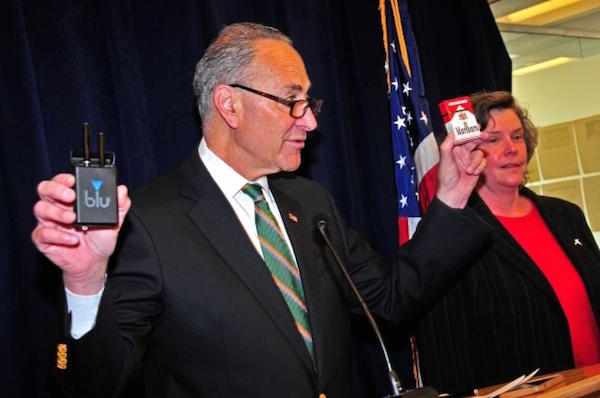
New York City Councilman Costa Constantinides introduced a bill on Tuesday proposing a ban on all flavored e-cigarettes, flatly claiming, “These flavors are direct marketing to children. They appeal to children, and we’re taking them out of that market.” To most people it goes without saying that flavors in e-cigarettes are one of the most appealing aspects of an almost certainly life-saving technology, but there have always been a peculiar subset of people who take Constantinides’ stance that they’re solely intended to lure children into nicotine addiction.
The story is yet again one of politicians and media outlets on one side, shouting from the rooftops based on naked speculation and blind fear, and vapers and advocates protesting on the other, hopelessly trying to crowbar their apparently alien concepts of logic and science-based decision-making into the debate. The ordinance is going to be heard before the Committee on Health, and could be discussed on Thursday, October 23rd.
Those Pesky Facts – E-Liquid Flavors, the Children and Gateways

The argument runs as follows: e-cigarettes are a new, trendy form of nicotine use, and children who otherwise would not have smoked will be attracted by some “irresistible” flavor and start to vape, then nicotine addiction will sink its devious claws in and drag the helpless child kicking and screaming into the deadly jaws of a lifelong smoking habit. Some even then convince themselves that this must be the evil e-cigarette companies’ actual intention, like Constantinides, who commented, “These guys are not in the quitting business. They’re in the addiction business.”
The problem is that all they ever have to go on is blind speculation based on common features of virtually all advertising and over-hyped results that always consistently demonstrate how hardly any non-smokers or non-smoking children are regular vapers. As for the gateway, the studies show that a small percentage will try vaping at least once, but basically none progress to regular use. A kid starting to smoke after being introduced to nicotine through vaping is a phenomenon so rare that there is no evidence that it’s ever actually happened. Think about it: would you choose the vastly safer, tasty e-cigarettes first and then device to progress to smelly, dangerous cigarettes afterwards, for the exact same drug?
And attacking flavors would likely impact on the adult ex-smokers who now vape, too. In fact, in a survey conducted on this topic, the majority of adult users used fruity or sweet flavors, and these flavors were more likely to be vaped by the ex-smokers in the sample. About half of the surveyed vapers said that restrictions on available liquid flavors would increase their craving for cigarettes, and just over 44 percent of the current smokers said it would make them less likely to reduce or quit smoking. In short, the legislation will likely do much more harm than it could hope to do good. Dr. Konstantinos Farsalinos, the lead researcher on the survey, has sent Constantinides a letter to this effect, addressing the “significant level of misinformation about electronic cigarettes” that drives such short-sighted proposals and urging him to reconsider.
CASAA points to the additional issue that all e-cigarettes are ultimately flavored; it’s not like PG, VG and nicotine would taste like tobacco in the absence of flavorings. So in that sense, it would be pretty arbitrary to dictate that all e-liquids have to be one or two specific flavors; you might as well just say they have to taste disgusting so nobody would like them.
Call to Action
CASAA has issued a Call to Action about the legislation, also drawing attention to the lack of an exemption for dedicated vaping shops; instead just including one for tobacco bars. The group encourages advocates and vapers in the Tri-State area to contact Health Committee council members and explain your opposition to the ordinance. You don’t technically have to live in NYC to participate, but it helps if you have some sort of connection with the city (such as family) to show why the issue is relevant to you.
We can only hope this senseless legislation is shot down, but for that to happen ordinary vapers will have to continue to stand up for their right to enjoy the products that helped them quit smoking. It’s sad, but that’s the world we live in.

